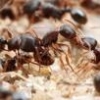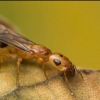Yesterday evening I found a group of fire ants preparing for a nuptial flight. I had to leave, so I just scooped as many as i could in an empty water bottle. When I got home, as expected, all queens and drones kept their wings except for one queen. One queen was showing signs of being mated, but obviously didn't fly. How did this happen?
- Formiculture.com
- Forums
- Gallery
- Members
- Member Map
- Chat






















